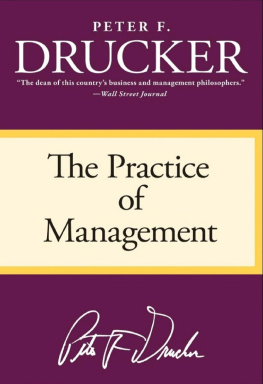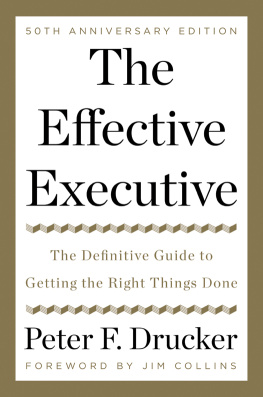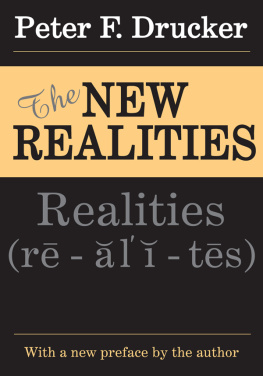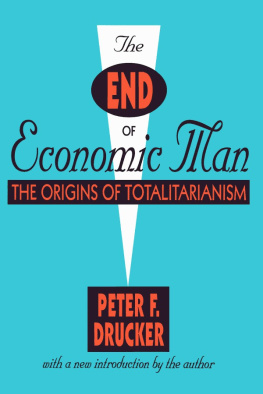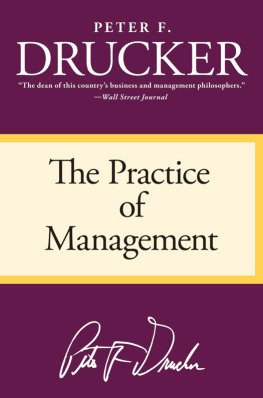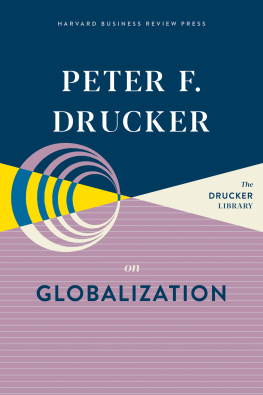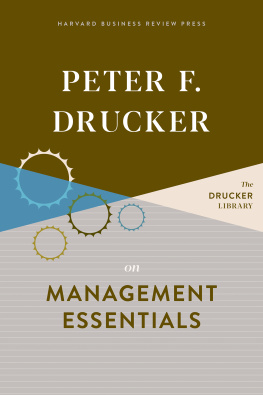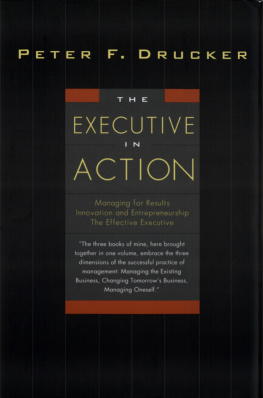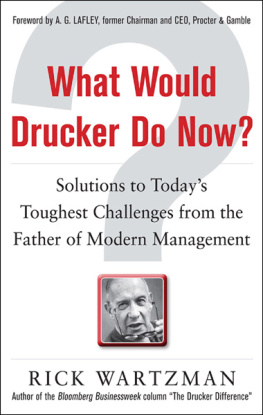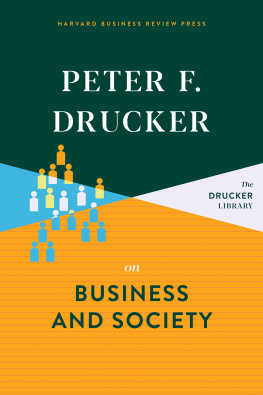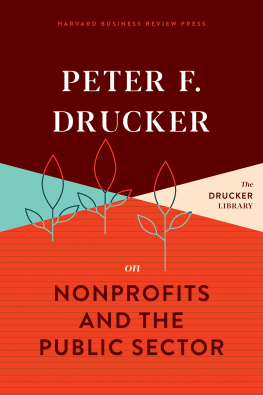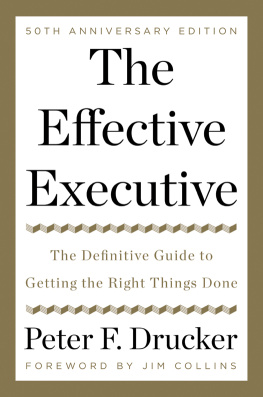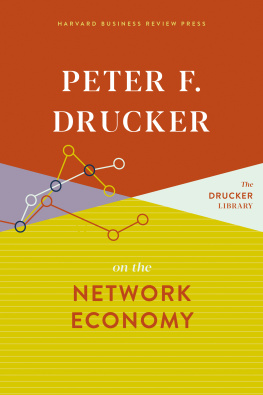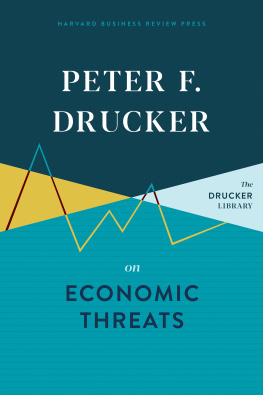Since 1922, Harvard Business Review has been a leading source of breakthrough ideas in management practice. The Harvard Business Review Classics series now offers you the opportunity to make these dr
uc
seminal pieces a part of your permanent management library. Each HaRvaRd BuSinESS REviEw
ker
highly readable volume contains a groundbreaking idea that continues C L A S S I C S
to shape best practices and inspire countless managers around the world.
The Theor
T h e T h e o r y
o f T h e B u s i n e s s
y of
Text tk text tk
The Business
Pet e r f. d r u cke r
Cover design: Kelly Blair
$xxx | Management
hbr.org
T H E T H E O R Y O F T H E
B U S I N E S S
HBR_Classics_Drucker.indb 1
03/02/17 6:35 pm
HBR_Classics_Drucker.indb 2
03/02/17 6:35 pm
HARVARD BUSINESS REVIEW
C L A S S I C S
T H E T H E O R Y O F T H E
B U S I N E S S
Peter F. Drucker
Harvard Business Review Press
Boston, Massachusetts
HBR_Classics_Drucker.indb 3
03/02/17 6:35 pm
HBR Press Quantity Sales Discounts Harvard Business Review Press titles are available at significant quantity discounts when purchased in bulk for client gifts, sales promotions, and premiums. Special editions, including books with corporate logos, customized covers, and letters from the company or CEO printed in the front matter, as well as excerpts of existing books, can also be created in large quantities for special needs.
For details and discount information for both print and ebook formats, contact booksales@harvardbusiness.org, tel. 800-988-0886, or www.hbr.org/bulksales.
Copyright 2017 Harvard Business School Publishing Corporation Originally published in Harvard Business Review in SeptemberOctober 1994
Reprint #94506
All rights reserved
No part of this publication may be reproduced, stored in or introduced into a retrieval system, or transmitted, in any form, or by any means (electronic, mechanical, photocopying, recording, or otherwise), without the prior permission of the publisher. Requests for permission should be directed to permissions@hbsp.harvard.edu, or mailed to Permissions, Harvard Business School Publishing, 60 Harvard Way, Boston, Massachusetts 02163.
The web addresses referenced in this book were live and correct at the time of the books publication but may be subject to change.
Cataloging-in-Publication data is forthcoming.
eISBN: 978-1-63369-253-4
HBR_Classics_Drucker.indb 4
03/02/17 6:35 pm
the harvard business review classics series
Since 1922, Harvard Business Review has been a leading source of breakthrough ideas in management practicemany of which still speak to and influence us today. The HBR
Classics series now offers you the opportunity to make these seminal pieces a part of your permanent management library. Each volume contains a groundbreaking idea that has shaped best practices and inspired countless managers around the worldand will change how you think about the business world today.
{ v }
HBR_Classics_Drucker.indb 5
03/02/17 6:35 pm
HBR_Classics_Drucker.indb 6
03/02/17 6:35 pm
T H E T H E O R Y O F T H E
B U S I N E S S
HBR_Classics_Drucker.indb 7
03/02/17 6:35 pm
HBR_Classics_Drucker.indb 8
03/02/17 6:35 pm
Not in a very long timenot, perhaps, since the late 1940s or
early 1950shave there been as
many new major management techniques as there are today: downsizing, outsourcing, total quality management, economic value analysis, benchmarking, reengineering.
Each is a powerful tool. But, with the excep-tions of outsourcing and reengineering, these tools are designed primarily to do
{ 1 }
HBR_Classics_Drucker.indb 1
03/02/17 6:35 pm
Peter F. Drucker
differently what is already being done. They are how to do tools.
Yet what to do is increasingly becoming the central challenge facing managements, especially those of big companies that have enjoyed long-term success. The story is a familiar one: a company that was a superstar only yesterday finds itself stagnating and frustrated, in trouble and, often, in a seemingly unmanageable crisis. This phenome-non is by no means confined to the United States. It has become common in Japan and Germany, the Netherlands and France, Italy and Sweden. And it occurs just as often outside businessin labor unions, government agencies, hospitals, museums, and churches.
In fact, it seems even less tractable in those areas.
{ 2 }
HBR_Classics_Drucker.indb 2
03/02/17 6:35 pm
The Theory of the Business The root cause of nearly every one of these crises is not that things are being done poorly. It is not even that the wrong things are being done. Indeed, in most cases, the right things are being donebut fruitlessly.
What accounts for this apparent paradox?
The assumptions on which the organization has been built and is being run no longer fit reality. These are the assumptions that shape any organizations behavior, dictate its decisions about what to do and what not to do, and define what the organization considers meaningful results. These assumptions are about markets. They are about identifying customers and competitors, their values and behavior. They are about technology and its dynamics, about a companys strengths and weaknesses. These assumptions are about
{ 3 }
HBR_Classics_Drucker.indb 3
03/02/17 6:35 pm
Peter F. Drucker
what a company gets paid for. They are what I call a companys theory of the business.
Every organization, whether a business or not, has a theory of the business. Indeed, a valid theory that is clear, consistent, and focused is extraordinarily powerful. In 1809, for instance, German statesman and scholar Wilhelm von Humboldt founded the University of Berlin on a radically new theory of the university. And for more than 100 years, until the rise of Hitler, his theory defined the German university, especially in scholarship and scientific research. In 1870, Georg Siemens, the architect and first CEO
of Deutsche Bank, the first universal bank, had an equally clear theory of the business: to use entrepreneurial finance to unify a
{ 4 }
HBR_Classics_Drucker.indb 4
03/02/17 6:35 pm
The Theory of the Business still rural and splintered Germany through industrial development. Within 20 years of its founding, Deutsche Bank had become Europes premier financial institution, which it has remained to this day in spite of two world wars, inflation, and Hitler. And, in the 1870s, Mitsubishi was founded on a clear and completely new theory of the business, which within 10 years made it the leader in an emerging Japan and within another 20 years made it one of the first truly multinational businesses.
Similarly, the theory of the business explains both the success of companies like General Motors and IBM, which have dominated the U.S. economy for the latter half of the twentieth century, and the challenges
{ 5 }
HBR_Classics_Drucker.indb 5
03/02/17 6:35 pm
Peter F. Drucker
they have faced. In fact, what underlies the current malaise of so many large and successful organizations worldwide is that their theory of the business no longer works.
Whenever a big organization gets into troubleand especially if it has been successful for many yearspeople blame sluggishness, complacency, arrogance, mammoth bureaucracies. A plausible explanation? Yes. But rarely the relevant or correct one. Consider the two most visible and widely reviled
arrogant bureaucracies among large U.S.
companies that have recently been in trouble.
Since the earliest days of the computer, it had been an article of faith at IBM that the
Next page

